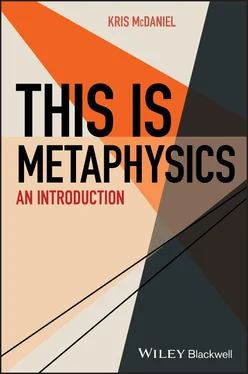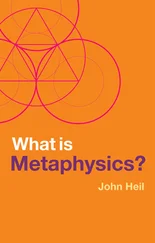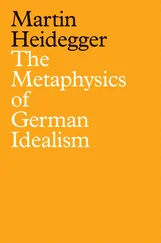1.46 There are some beliefs that don’t count as knowledge. For example, some people have false beliefs, and no false belief can be knowledge. The other day, I was trying to find my wallet. I had a very strong belief that I had left it on top of the fridge the previous evening. My wife insisted that I hadn’t, and I replied that I knew that I had. It turns out that I had left my wallet in my office. Given where my wallet in fact was, I didn’t know that I had left my wallet on top of the fridge. I only thought that I knew. Reflecting on this story makes it clear that a belief counts as knowledge only if that belief is true. But it’s also clear that merely having a true belief is not sufficient for that belief to count as knowledge. Suppose someone, who we will call “Fred,” reads the story I just told and as a consequence comes to believe that my wallet had been in my office. Fred’s belief is true, but does it count as knowledge? Well, you might think that Fred actually doesn’t have that great of a reason for believing that I left my wallet in my office. It is a well‐known fact that philosophy professors make up stories all the time just to provide vivid illustrations of some point that they want to make. Fred doesn’t have enough evidence to rule out the possibility that I am just making up a story. So, even though Fred’s belief is true, Fred’s belief doesn’t count as knowledge. It just doesn’t have what it takes to count as knowledge. Ok, so what does it take for a belief to count as knowledge? In other words, what are the necessary and sufficient conditions that something has to meet in order for it to be an instance of knowledge? This might be the most important question of epistemology, and if this were an epistemology book, we’d focus on it further.
1.47 The question “What does it take for a belief to count as knowledge?” is a different question from “Which beliefs count as knowledge?” The first question asks for insight into what knowledge is, while the second question asks for a list of beliefs that are known. In principle, someone could answer the second question simply by exhaustively listing all of the beliefs that count as knowledge, which include Jason’s knowledge that the sky is blue, Marcy’s knowledge that 2 + 5 = 7, Raul’s knowledge that World War II took place prior to the first Gulf war, Shamik’s knowledge that emeralds are green, and so on. But this sort of list doesn’t by itself answer the question “What does it take for a belief to count as knowledge?” If we had an answer to that question, we’d know why all the items on the list of beliefs that count as knowledge belong on this list.
1.48 The same idea applies to the two questions “What does it take for some things to objectively belong to each other?” and “Which groups of things objectively belong together?” An answer to the first question provides necessary and sufficient conditions that a group of things have to meet in order to objectively belong to each other, while an answer to the second question could simply take the form of a list: these things objectively belong together , and so do those other things , and so on.
1.49 Even though we’ve distinguished the two questions, as I said earlier, finding the answer to one of these questions might help us find an answer to the other. If we had an accurate list of which groups of things objectively belonged together, we could use that list to test alleged answers to the first question. Suppose, for example, that a proposed answer to the first question said that having X is what it takes for some group of things to objectively belong together, but one of the groups on our accurate list did not have X. We’d be able to deduce that this proposed answer to the first question is mistaken. On the other hand, if we had an answer to the first question, we’d hopefully have some guidance on how to go about making our list of things that do objectively belong together.
1.50 So, we should distinguish our two questions, but keep in mind that the strategies for answering them might not be completely independent of each other. In the following section, we are going to focus on the first question of what it takes for some things to objectively belong to each other.
1.6 Classification and Properties
1.51 Here is a natural train of thought. Things objectively belong together when they are similar in important ways. Things are similar in some way if and only if there is some way that those things all are. We call ways that things are properties . So, what it is for things to belong together is for them to share certain important properties.
1.52 But although this train of thought is natural, someone might reasonably worry that we won’t travel very far on it. After all, this train of thought leads us to the question “What makes a property an important property?” If our only answer to that question is that important properties are those that things have when they objectively belong together, we are riding the train on a circular track, and we are no better off than we were when we started. (Circular explanations seem to get you nowhere, intellectually speaking.)
1.53 The question “What makes a property an important property?” matters if we assume both that there are some important properties and that there are some unimportant properties as well. But maybe the latter assumption is one that we shouldn’t make; maybe we should believe that the only properties that exist are the important properties. If the only properties that exist are the important properties, then we can say that things objectively belong together if and only if they have a property in common. This train of thought is less obviously on a circular track. We still need to face the question of what properties there are though.
1.54 In order to address the question of what properties there are, it might be useful to have a quick discussion about how we attribute properties to things in ordinary language.
1.55 Consider the sentence “Kris is short.” The subject of this sentence is the name “Kris.” The remainder of the sentence is the predicate “is short.” Very roughly, in general, a predicate is that part of a sentence which contains a verb and is used to state something about what is named by the subject of that sentence. Other examples: in the sentence, “Ranger is a dog,” “Ranger” is the subject and “is a dog” is the predicate; in the sentence “Ben eats French fries,” “Ben” is the subject and “eats French fries” is the predicate; in the sentence “José was an awesome teacher,” “José” is the subject and “was an awesome teacher” is the predicate. I hope this rough definition of the word “predicate” and the examples just mentioned have succeeded in giving you the idea of what a predicate is.
1.56 Predicates are used to say something about what is named by the subject of the sentence. Does this mean that, for every predicate, there is a corresponding property? Should we say that, since we can state something true of Ranger when we say “Ranger is a dog,” there is a property of being a dog? Ranger is a dog. Is there therefore a property of being a dog that Ranger has? This thought might seem plausible at first—what is the something that is true of Ranger if it is not a property had by Ranger? But if there is a property corresponding to every predicate, then there must be unimportant properties as well as important properties. For the following sentence is true: “Ranger is a dog or a fish or an automobile,” and so corresponding to the predicate “is a dog or a fish or an automobile” is a property, namely, the property of being a dog or a fish or an automobile. If there is a property of being a dog or a fish or an automobile, it is a property had by Ranger, the fish in my daughter’s fish tank, and the leaf‐filled convertible rusting on the street down the block. But these things do not objectively belong together simply because they have this property. The property of being a dog or a fish or an automobile is not an important property.
Читать дальше












